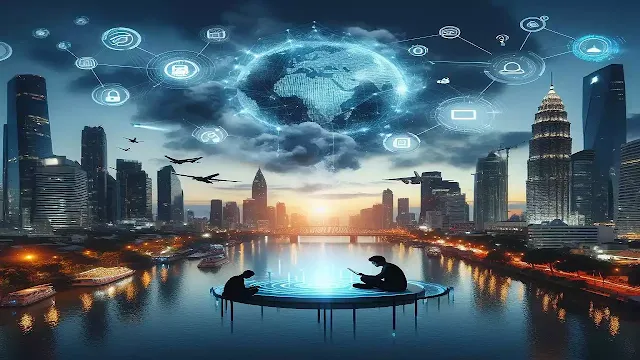The Impact of Technology on Society: Unashing the Power of Digital Transformation
Introduction
Welcome to the digital revolution where technology has become an integral part of our daily lives. From smartphones to smart homes, we are witnessing unprecedented advancements that are transforming the way we live, work, and interact.
 |
The Impact of Technology on Society |
Technology and Society: A Symbiotic Relationship
The Influence of Technology on Communication
One of the most significant impacts of technology on society is its effect on communication. The advent of smartphones and the internet has revolutionized the way we connect with one another. Instant messaging, social media, and video calls have bridged the gap between people across the globe. We can now effortlessly share information, ideas, and experiences in real-time, fostering a global community. However, we must be mindful of striking a balance between virtual interactions and face-to-face connections to maintain meaningful relationships.
The Transformation of Industries
Technology has disrupted industries across the spectrum, from manufacturing to finance, healthcare to entertainment. Automation, artificial intelligence, and data analytics have revolutionized processes, leading to increased efficiency and productivity. However, this rapid transformation also brings forth concerns about job displacement. As technology continues to evolve, employers and employees must adapt by developing new skills and embracing lifelong learning.
The Changing Nature of Education
The integration of technology in education has opened up new avenues for learning. Online courses, virtual classrooms, and educational apps have made education accessible to a wider audience, breaking down geographical barriers. Additionally, technology aids interactive and personalized learning experiences, making education more engaging and efficient. However, it is crucial to address the digital divide and ensure equal access to education for all.
Balancing Opportunities and Challenges
The Rise of Artificial Intelligence
Artificial Intelligence (AI) has emerged as a game-changer in various domains, including healthcare, finance, and customer service. AI-powered chatbots, machine learning algorithms, and predictive analytics have transformed the way businesses operate. However, ethical concerns surrounding AI, such as privacy invasion and biased algorithms, need to be addressed to harness its full potential while ensuring accountability.
Privacy and Security Concerns
As technology evolves, so do concerns regarding privacy and data security. With the vast amount of personal information being shared online, cyber threats have become a pressing issue. It is essential for individuals and organizations to prioritize cybersecurity measures to safeguard sensitive data. Striking a balance between convenience and privacy is a crucial challenge that requires continuous innovation and robust policies.
Job Displacement and The Future of Work
The increasing automation of tasks raises concerns about job displacement and the future of work. While technology has the potential to streamline processes and increase efficiency, it also threatens certain job roles. However, history has shown that technological advancements also create new job opportunities. The key lies in equipping the workforce with the necessary skills to adapt and thrive in the digital age.
Cultivating Digital Literacy and Inclusion
Bridging the Digital Divide
While technology has the power to connect and empower, it also perpetuates inequality when access is limited. Bridging the digital divide requires efforts to provide equal access to technology and internet connectivity. Governments, organizations, and communities must collaborate to ensure that no one is left behind in this digital era.
Promoting Accessible Technology
Building upon the principles of inclusivity, technology should be designed to cater to individuals with disabilities. Accessible technology, such as screen readers and specialized software, enhances the lives of people with diverse abilities, fostering a more inclusive society. By embracing universal design principles, we can create a world where technology is accessible to all.
Enhancing Digital Skills
In an increasingly digital world, it is imperative to equip individuals with the necessary digital skills. From basic computer literacy to advanced programming, digital skills are becoming essential for employ and participation in modern society. By investing in digital education and training programs, empower individuals to navigate the digital landscape with confidence.
Communication Ethics and Digital
Social Media Influence on Society
Social media platforms have revolutionized the way we communicate and share information. They have the power to connect, mobilize, and amplify voices, leading to positive social change. However, concerns regarding online harassment, spread of misinformation, and filter bubbles need to be addressed. Responsible use of social media platforms is crucial for a healthy and informed society.
Misinformation and Fake News
The digital age has witnessed an exponential surge in misinformation and fake news. In a world where information spreads rapidly, it is essential for individuals to critically evaluate sources and engage in fact-checking. Media literacy and digital literacy programs play a pivotal role in equipping individuals with the skills to discern accurate information from falsehoods, promoting a well-informed society.
Maintaining Digital Etiquette
As technology facilitates communication, it is essential to uphold digital etiquette. Treating others with respect, practicing empathy, and being mindful of the impact of our words and actions contribute to a positive online culture. By fostering digital empathy and responsible digital citizenship, we can build a digital society that promotes inclusivity, understanding, and constructive dialogue.
Harnessing Technology for Social Good
Improving Healthcare and Wellness
Technology has revolutionized healthcare, enhancing diagnosis, treatment, and patient care. From wearable devices that monitor health parameters to telemedicine platforms that enable remote consultations, technology has the potential to improve accessibility and outcomes in healthcare. By leveraging data analytics and artificial intelligence, we can achieve personalized medicine and drive advancements in the field.
Preserving the Environment
As sustainability becomes increasingly critical, technology plays a vital role in environmental preservation. Innovations such as renewable energy sources, smart grids, and sustainable agriculture practices contribute to mitigating climate change. By embracing technology, we can build a greener future and preserve our planet for generations to come.
Empowering Social Movements
Technology has emerged as a powerful tool in mobilizing and empowering social movements. Social media platforms have played a significant role in raising awareness, organizing protests, and giving voice to marginalized communities. By harnessing the power of technology, we can create platforms that amplify underrepresented voices and drive positive change.
Conclusion
The intertwining of technology and society has ushered in a new era of possibilities and challenges. From revolutionizing communication to transforming industries, the impact of technology is undeniable. However, as we embrace the digital transformation, it is vital to strike a balance between progress and responsibility. By cultivating digital literacy, promoting inclusivity, and harnessing technology for social good, we can shape a future where technology serves as a catalyst for human progress. Join us in embracing the power of technology as we navigate the ever-evolving landscape of the digital age.





